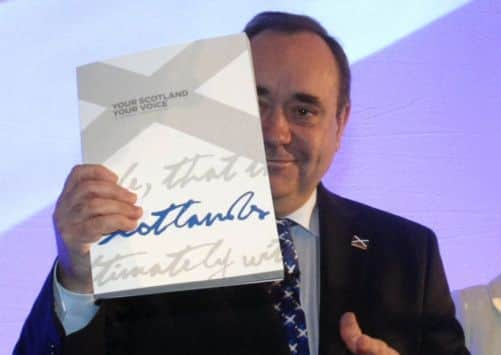Lesley Riddoch: White paper won’t be a revelation


SCOTs are on the edge of our collective seats. It’s the only conclusion outsiders could draw from the constellation of forces gathering for tomorrow’s launch of the independence white paper in Glasgow.
On 24 March, 2016, all negotiations will stop and Scotland will sail into the blue yonder as an independent state – if there’s a Yes vote in 2014 of course. Tomorrow, flesh will be put on to the bones with the publication of a definitive independence blueprint. What could be more exciting?
Advertisement
Hide AdAdvertisement
Hide AdJournalists from across the globe, including the entire press corps of Spain, are heading for the Glasgow Science Centre and even the UK media – fresh from covering equally surreal “news” about Monty Python and Doctor Who – are giving this formal moment its due, booking stances with suitable backdrops for the usual talking heads to analyse what is about to be said. And yet those interested in the constitutional debate already know what is about to be said.


Scots won’t need to change money or carry a passport to cross the border, the division of assets (and the continuing use of sterling) will be negotiated, existing UK services like the BBC will still be available, an SNP-led independent Scottish Government will scrap the UK’s welfare “reforms” and will confound the gloomiest predictions of the Institute for Fiscal Studies through the increased vitality of a nation able to encourage immigration, deter emigration and encourage fairness and growth.
To be honest, you either broadly buy this as a viable proposition by now, or you don’t.
One commentator observed that after dozens of position papers from the Westminster government (the paperwork blizzard dismissed by the Yes campaign as Project Fear), both cases will finally be “down on paper” this week side by side for the public to scrutinise.
Except they won’t.
The majority of folk don’t read a car manual before they get into the driver’s seat or scrutinise the small print before they plough savings into a pension. We are not a nation given to the forensic scrutiny of lengthy written documents unless they happen to be Harry Potter and the Half Blood Prince (whose page length the white paper apparently equals).
Those with very specific questions will get answers – of sorts. But the best this white paper can probably do is produce a framework of thought, a summary of what’s already known, a list of what needs to be negotiated…. and no major hostages to fortune.
Hardly a sizzler. And the work of translating that dry-as-dust framework into meaningful, colourful realities still lies ahead for Yes campaigners.
So can the white paper’s publication transform the independence debate? Or do other factors hold greater sway over undecided Scots – 15 per cent of all voters in the latest Panelbase survey?
Advertisement
Hide AdAdvertisement
Hide AdIn truth no single aspect of the white paper is as important as three questions it cannot even tackle.
First – how will the rest of the UK actually respond to a Yes vote? Right now, even our Welsh Celtic cousins are playing hardball. And yet – as negotiations with Iran demonstrated this weekend – states will sup with the devil if it’s in their interests to do so and the alternative is less palatable. Which will it be?
Second – do Scots believe we have the practical capacity to thrive outside the UK even if they accept there’s a case for it in theory?
Alex Salmond is an instinctive gambler who revels in risk, spontaneity, negotiation and playing it by ear – qualities which impress but also scare the pants off risk-averse, public sector Scots. The SNP may relish the Big Negotiation that lies beyond a Yes vote. The bulk of Scots cannot visualise it. Does that constrain support for independence?
Finally – will the voting public ever get (or even demand) the same degree of forensic detail from Better Together about the case for staying in the UK? Without such a detailed rebuttal, it will be impossible for voters to compare like with like in September 2014 – and that’s why there’ll be no Life in the Union blueprint in response to the white paper.
Indeed, the forthcoming UK general election and EU “in-out” referendum mean today’s unionist guarantees are really as tentative as those in the white paper.
But that realisation hasn’t fully dawned on most Scots. Next year we are actually choosing between two alternative scenarios of the future – not just administering the thumbs up or down to independence. This may seem like hair-splitting. It’s not.
The health, predictability and underlying stability of the UK is always taken as a given – never subject to the same level of scrutiny as the independence option, even though certainty about either option is equally questionable.
Advertisement
Hide AdAdvertisement
Hide AdIf this was an important individual decision like the choice between two homes or two cars, you can bet your bottom dollar the pros and cons of each option would be minutely listed, questioned and compared by prudent consumers.
And yet as citizens we are content to make a decision on the future of Scotland based on scrutinising the apparent shortcomings of the independence option only.
Perhaps that’s testimony to the success of Project Fear. Perhaps that’s because Scots are more practised consumers than citizens (with a miserable 38 per cent turnout at elections for the largest and remotest “local” authorities in Europe and negligible turnout for utterly toothless community councils).
Perhaps it’s the inevitable burden placed upon those who advocate change.
And yet if change saved Scotland from an economic and social cataclysm, there would be less quibbling about the new course.
Our family moved from Belfast to Glasgow in 1973 in a rush and with many practical details still up in the air. We didn’t have a house. My brother and I didn’t have schools. But those were minor fixable problems compared with the near cast-iron certainty that the “Troubles” would blight the whole of our school careers if we stayed. So very reluctantly, we left.
The viability of any alternative path is related to the rockiness of the existing road. And yet that too is subjective.
So tomorrow it will be easy to poke fun.
And yet the UK will not produce a similar statement of intent. That’s worth demanding. And the near certain refusal to deliver is worth bearing in mind over the next eventful nine months.